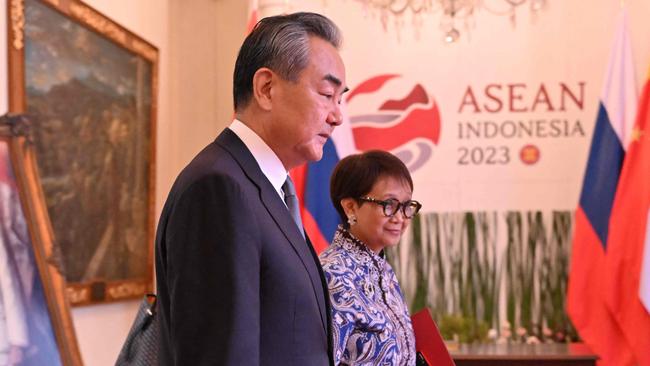ASEAN pushes to finalise talks for code of conduct in South China Sea
Southeast Asian nations are pushing for China to quickly finalise negotiations for a code of conduct in the South China Sea.

Southeast Asian nations are pushing for China to quickly finalise negotiations for a code of conduct in the South China Sea amid Beijing’s continued territorial overreach.
Speaking as ASEAN chair this year, Indonesia said the bloc had reached several key milestones with China, including finalising guidelines for a code for the disputed waterways, 20 years since China acceded to an ASEAN treaty of co-operation.
“We want China to be a staunch ASEAN partner in maintaining an open and inclusive regional architecture,” Foreign Minister Retno Marsudi said on Thursday.
“Only through this can we attain win-win co-operation for the sake of common peace, stability, and prosperity in the Indo-Pacific.”
China and ASEAN agreed in 2002 to work towards a code of conduct to reduce tension in the strategic waterways, but it took 15 years before they could agree to negotiations.
Beijing claims much of the South China Sea and has built islands from which it is capable of deploying advanced weaponry, stoking fears among neighbouring nations especially The Philippines, Vietnam, Malaysia, and Brunei who have overlapping claims with their northern neighbour.
Philippines Foreign Secretary Enrique Manalo said the code of conduct negotiation would be a long process because there were many issues that needed to be settled but all parties had the political will to complete the process.
The Philippines won an arbitration case in 2016 that invalidated China’s claims in the South China Sea, but China continues to ignore the ruling.
The Philippines Coast Guard recently accused Chinese patrol vessels of blocking two of its boats in the waterway, describing their actions as “very dangerous”.
In April, Manila granted the US military access to four new bases, in addition to five existing facilities – three facing north towards Taiwan and one near the disputed Spratly Islands in the South China Sea.
ASEAN foreign ministers were expected to highlight that some members were concerned about the land reclamations, and serious incidents in the sea, “which has eroded trust and confidence, increased tensions, and may undermine peace, security, and stability in the region” according to a draft joint communique seen by The Australian this week.
Australian Foreign Minister Penny Wong expressed her support at the Jakarta summit to her Southeast Asian counterparts.
“We believe rules and norms, including the UN Convention on the Law of the Sea, are critical for our collective security,” she said on Thursday.



To join the conversation, please log in. Don't have an account? Register
Join the conversation, you are commenting as Logout